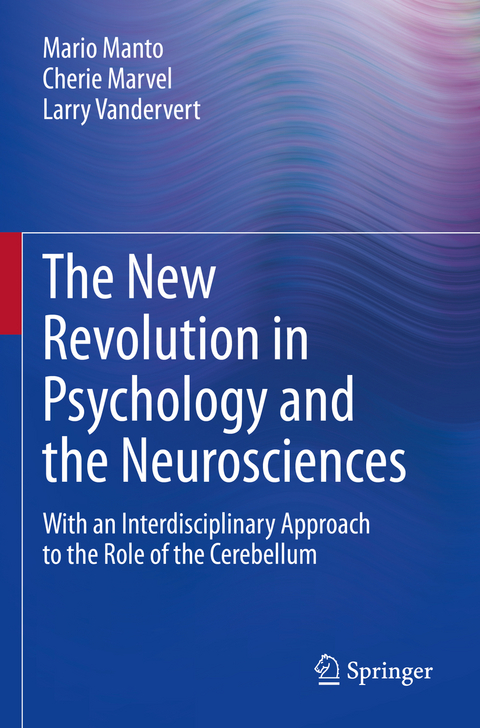
The New Revolution in Psychology and the Neurosciences
Springer International Publishing (Verlag)
978-3-031-06095-3 (ISBN)
Historically researchers of neuroscience and psychology have believed that the cerebral cortex produces the unique mental capacities of human beings. However, a prevalence of brain-imaging evidence now shows that the cerebral cortex, while the seat of our everyday experience (notably in working memory), is not predominant in actually formulating our amazing capabilities. Rather, the achievements that mark humans as "Homo sapiens" originate in the cerebellum which increased three- to fourfold in size and acquired massive cognitive and social optimization capabilities over the last million years. Thus, through its optimization of experience and skill of the cerebral cortex, it was the cerebellum that was and is predominant in producing culture, language, mathematics, creativity, and extreme levels of skill in all areas from sports to computer science and art. These optimizing functions of the cerebellum are shown in the cases of Albert Einstein, Wolfgang Amadeus Mozart, Maryam Mirzakhani, and the predictive powers of Stonehenge.
This book fills a critical role in bringing courses up-to-date with the profound, basic changes this newly understood predominant role of the cerebellum provides for understanding the mechanisms related to all topics in psychology and neuroscience. It is critical that this "new revolution in psychology and the neurosciences" be introduced and reviewed in courses that are part of both undergraduate and graduate studies in psychology and neuroscience. This text might also be of use to courses in anthropology and cross-disciplinary studies as the cerebellum was critically involved in the evolution of cognitive and social behaviour.
lt;p>Mario Manto, MD PhD
Dr. Manto is a clinical neurologist who studies cerebellar disorders, and is the Founding Editor of the journal, The Cerebellum. He is affiliated with both the Unité des Ataxies Cérébelleuses, Service de Neurologie, CHU-Charleroi, Belgium and Service des Neurosciences, Université de Mons, Belgium.
Cherie Marvel, PhD
Dr. Marvel is a cognitive neuroscientist who studies cerebellar motor and non-motor functions in healthy and clinical populations. She is faculty in the Department of Neurology at the Johns Hopkins University School of Medicine, USA.
Larry Vandervert, PhD
Dr. Vandervert is a retired college professor with published works in the cerbellum's role in creativity, innovation, child prodigy giftedness, and mathematics.
Chapter 1: What is the revolutionary conception of the cerebellum-driven working memory and language of Homo sapiens?.- Chapter 2: How, exactly, did this revolutionary concept of the human mind come about?.- Chapter 3: What, exactly, is prominent role of the cerebellum in everyday learning and thinking?.- Chapter 4:How did and how does the cerebellum prominently contribute to the development of the mind of both ancient and modern peoples?.- Chapter 5: Without the contribution of the cerebellum, we could not be creative-the cerebellar origin of sudden insight (the a-ha! phenomenon) in working memory.- Chapter 6: Without the contribution of the cerebellum, we would not have mathematics..- Einstein was smart, but his cerebellum actually guided his super superior thinking.- Chapter 7: How can people play a complex piano piece (in the cerebellum) and carry on an equally complex conversation at the same time?.- Chapter 8: The crucial role of the cerebellum in the development of the signature moves of sports heroes.- Chapter 9: How does the cerebellum make play more skillful, improve personality and make one more creative?.- Chapter 10: What crucial role does the cerebellum play in mental disorders?.
| Erscheinungsdatum | 27.06.2023 |
|---|---|
| Zusatzinfo | XI, 127 p. 1 illus. |
| Verlagsort | Cham |
| Sprache | englisch |
| Maße | 155 x 235 mm |
| Gewicht | 224 g |
| Themenwelt | Geisteswissenschaften ► Psychologie ► Biopsychologie / Neurowissenschaften |
| Naturwissenschaften ► Biologie ► Humanbiologie | |
| Schlagworte | cerebellum • Creativity • learning • Mathematics • Mental disorders |
| ISBN-10 | 3-031-06095-4 / 3031060954 |
| ISBN-13 | 978-3-031-06095-3 / 9783031060953 |
| Zustand | Neuware |
| Informationen gemäß Produktsicherheitsverordnung (GPSR) | |
| Haben Sie eine Frage zum Produkt? |
aus dem Bereich


